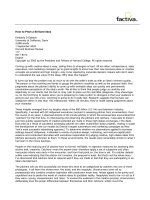How to become a coach part II
Bạn đang xem bản rút gọn của tài liệu. Xem và tải ngay bản đầy đủ của tài liệu tại đây (3.19 MB, 57 trang )
HowtoBecomeaCoach:PartII
TondeGraaf
Downloadfreebooksat
Ton de Graaf
How to Become a Coach: Part II
2
Download free eBooks at bookboon.com
How to Become a Coach: Part II
1st edition
© 2013 Ton de Graaf & bookboon.com
ISBN 978-87-403-0611-8
3
Download free eBooks at bookboon.com
How to Become a Coach: Part II
Contents
Contents
1
he future of coaching
7
1.1
What is the GCC process?
7
1.2
he beneits of involvement
8
1.3
Participating Organizations
9
1.4
International agreement – Can it work?
10
1.5
How does it work?
10
2
Qualiications and training in coaching
12
2.1
Education & Credentialing
13
2.2
Overview
13
2.3
Granting institution
14
2.4
Master of Arts (Business Coaching)
14
2.5
he Registered Corporate Coach designation
14
2.6
Guiding standards
14
2.7
Granting institution
14
2.8
How to obtain the RCC designation
15
2.9
Associate Certiied Coach (ACC)
16
www.sylvania.com
We do not reinvent
the wheel we reinvent
light.
Fascinating lighting offers an ininite spectrum of
possibilities: Innovative technologies and new
markets provide both opportunities and challenges.
An environment in which your expertise is in high
demand. Enjoy the supportive working atmosphere
within our global group and beneit from international
career paths. Implement sustainable ideas in close
cooperation with other specialists and contribute to
inluencing our future. Come and join us in reinventing
light every day.
Light is OSRAM
4
Download free eBooks at bookboon.com
Click on the ad to read more
How to Become a Coach: Part II
Contents
2.10
Professional Certiied Coach (PCC)
16
2.11
Master Certiied Coach (MCC)
16
2.12
European Coaching Institute
17
3
Coach Mentoring Program
19
4
What You Will Need to Start your Coaching Business
20
5
Business & Marketing Plan
24
6
he Income Streams of a coach
26
7
How to Build Your Business
28
8
Examples of Niches:
33
9
Selling your coaching
34
9.1
Traditional selling model
34
360°
thinking
.
Discover the truth at www.deloitte.ca/careers
5
Download free eBooks at bookboon.com
© Deloitte & Touche LLP and affiliated entities.
Click on the ad to read more
How to Become a Coach: Part II
Contents
9.2
Buyer-centric model
35
11
Overcoming objections
42
12
he basics of coaching
44
13
Models and processes
45
14
Ethics
53
Endnotes
57
6
Download free eBooks at bookboon.com
How to Become a Coach: Part II
The future of coaching
1 The future of coaching
he Global Convention on Coaching
1.1
What is the GCC process?
he GCC is a yearlong process in which all the key stakeholders in coaching (consumers, practitioners,
educators and industry bodies) will be gathering together to discuss the diicult issues facing us in
professionalizing coaching. It is a world-wide collaborative dialogue that seeks to understand the needs of
coaching consumers, practitioners and educators in order to develop commonly agreed understandings,
guidelines and frameworks for the practice of coaching and the training of coaches.
Some background:
Coaching is gradually emerging as a valued intervention in a wide variety of areas. Buyers of coaching
are increasingly demanding evidence that its practitioners are well trained and operating according to
clear professional standards underpinned by evidence. (CIPD, 2006)
In response to this need, serious attempts to identify competencies for practice, codes of conduct,
standards of training and the knowledge base for a profession are being made by a range of organizations,
each representing diferent stakeholders. Worldwide, there are a signiicant and growing number of
Universities ofering postgraduate qualiications in coaching. hese universities are also beginning to
establish regional groups in order to discuss common understandings and standards in the ield.
7
Download free eBooks at bookboon.com
How to Become a Coach: Part II
The future of coaching
So there are many stakeholders working toward establishing the profession of coaching. However, these
stakeholders have yet to collaborate in any detailed way to establish a commonly accepted knowledge
base, training frameworks and standards for professional practice.
For this reason the plethora of initiatives are likely to serve to confuse clients, particularly when they are
presented as (or perceived to be) in competition with each other, rather than overlapping on commonly
agreed standards.
We believe the time is right for the key stakeholders to come together to explore the development of
shared frameworks capable of supporting a profession of coaching. hese key stakeholders include:
Coaching providers
Coaching buyers and consumers
Universities and coach training organizations
Coaching industry bodies
Parallel professions involved in coaching internationally, representatives of Australian, North American
and European universities have begun to talk about holding a conference for this purpose. Professional
Bodies such as the Australian Psychological Society and the British Psychological Society have entered
into the dialogue, along with a range of other stakeholders. Concurrently, the ICF has begun discussing
similar issues, most notably in Vancouver in 2006.
We have discussed this idea with a signiicant number of key stakeholders who have all expressed
enthusiastic support for a Global Convention on Coaching. Such a convention would not seek to create
one standard imposed on all. Rather, its purpose is to begin to develop frameworks of equivalence and
shared interests that have wide stakeholder support.
1.2
The beneits of involvement
Coaching is already a multi-billion dollar industry worldwide. Given the growing use of coaching in
areas as diverse as organizational learning and development, health care and personal development, this
conference may prove to be an event of major international signiicance. here are a number of important
beneits for all stakeholders in developing core understandings around coaching and coach training.
For those who purchase and consume coaching services, it helps develop greater certainty in selection
and evaluation of coaches. It also helps them to identify what sort of coaches are needed for particular
issues and when coaching may not be the preferred intervention.
For those involved in training of coaches such understandings can guide the development of curricula,
more efective targeting of speciic areas of specialty and the assessment of coaching competence.
8
Download free eBooks at bookboon.com
How to Become a Coach: Part II
The future of coaching
For coach practitioners shared frameworks can provide commonly accepted credentialing, guiding
professional development eforts, and in the self-assessment of their practice.
1.3
Participating Organizations
Discussions were held with numerous bodies who have members participating in the dialogue. However,
no one of these members is there to represent their body. hey come to present their experience and
participate in the dialogue. Hence no particular stance is promoted and no association is bound by the
outcomes of the process. his is central to the success of the dialogue, they participate as equals, share
ideas, produce scenarios and consult with their respective networks. In this way all can be assured that
this is an open process, not one designed to meet predetermined outcomes.
In Europe:
• European Mentoring and Coaching Council
• Association Européene de Coaching
• Irish Coach Development Network
• Association for Professional Executive Coaches and Supervisors
• University Faculty from: Middlesex University, Oxford Brookes, City University London,
Sheield Hallam,
• Charles University in Prague
• Association for Coaching
• Spanish Association of Coaching
In North America:
• Universities across the US and Canada represented by the Graduate School Alliance for
Executive coaching (GSAEC)
• Worldwide Association of Business Coaches
• he Alliance of Coach Training Organisations
In Australasia and Southern Africa:
• Universities across Australia represented by the Australia Universities Strategic Alliance in
coaching (AUSAC)
• Australian Psychological Society
• New Zealand Coaching and Mentoring Forum
• Comensa (Coaches and Mentors of South Africa)
• Society for Industrial and Organisational Psychology, South Africa (SIOPSA)
9
Download free eBooks at bookboon.com
How to Become a Coach: Part II
The future of coaching
Other internationally representative bodies who either buy or provide coaching services. hese include:
• International Coach Federation
• Human Resources Associations for example the Chartered Institute of Personnel and
Development
• International Business Groups
• Management, Organisational and Work Psychology Groups,
• A range of multinational companies
• Wachovia Bank
• NASA
• he Teleran Group
• Blake Dawson and Waldron
1.4
International agreement – Can it work?
Lessons from Apartheid South Africa
Clearly, gathering together all the major stakeholders in coaching in order to begin to discuss common
frameworks and standards is a daunting task. here is much potential for the polarization, division and
even disintegration as everyone argues for their own perspective.
hankfully, discussion processes exist that can help us avoid those outcomes. One such process is the
model adopted by the leaders of the opposing factions in South Africa in order to collectively discuss
the future for South Africa at the end of apartheid – the Mont Fleur process. his is the model on which
we would like to loosely base the Global Convention on Coaching (GCC).
1.5
How does it work?
he process itself is relatively simple. Convention Members gather together to identify the key issues
and potential ways forward. hey do this by developing a series of future scenarios based on diferent
ways of resolving the key questions. For example, in South Africa, the participants developed four
potential scenarios for the way South Africa might develop. he irst was based on a strategy of avoiding
a negotiated settlement. (they named this the Ostrich scenario) he second considered a prolonged
transition process which attempted to respond to all parties but satisied none. (the Lame Duck Scenario)
he third sought to buy a way forward via unrestrained spending, (the Icarus scenario) and the fourth
envisaged a systematic approach in which key building blocks are put in place to support change. (the
Flight of the Flamingos) hrough the generation and discussion of these possible scenarios, previously
warring parties were able to reach shared understanding and agreement. (For a more detailed account
of this process as used to solve complex issues in South Africa and elsewhere, see Adam Kahane (2004)
Solving tough problems. San Francisco: BK press.)
10
Download free eBooks at bookboon.com
How to Become a Coach: Part II
The future of coaching
What might this look like for coaching?
Once the areas to be explored have been identiied, working groups on each area, made up of Convention
Members, would develop scenarios based on diferent ways of resolving the issues associated with their
area. For example, the working party on a code of ethics might consider what the future would look like
if there were (i) no formal shared codes of ethics, (ii) a single code to which all subscribe, (iii) a core code
with variations for diferent groups, or (iv) disparate multiple codes for diferent groups and stakeholders.
he scenarios for each key issue area would be disseminated to the wider discussion group for feedback
and a white paper produced for discussion at the Global Convention on Coaching in July 2008.
Some possible outcomes for the Convention
here are many possible outcomes for the convention – what they are will depend on the dialogue that
occurs. It is possible that we may begin to approach agreement on a core set of common standards around
the practice of coaching, and the training of coaches! Once again, the task is not to create a single model
of coaching or coach training. Rather it is to acknowledge and value the diversity that exists in ield, and
to begin the discussion about what competencies, knowledge and practice standards coaches already
hold in common, and those we believe we should hold in common. he development of more speciic
frameworks for areas of specialty, such as business coaching, executive coaching, health coaching etc. is
also a possible outcome. Another possible outcome may be the establishment of an international group
made up of the member partners to continue this dialogue.
If you want to know more about the GCC and their ongoing activities, go to their website:
Ater the July Convention in Dublin participants agreed to change the abbreviation GCC from Global
Convention on Coaching into Global Coaching Community. A more appropriate name I think and
better workable for the future.
11
Download free eBooks at bookboon.com









